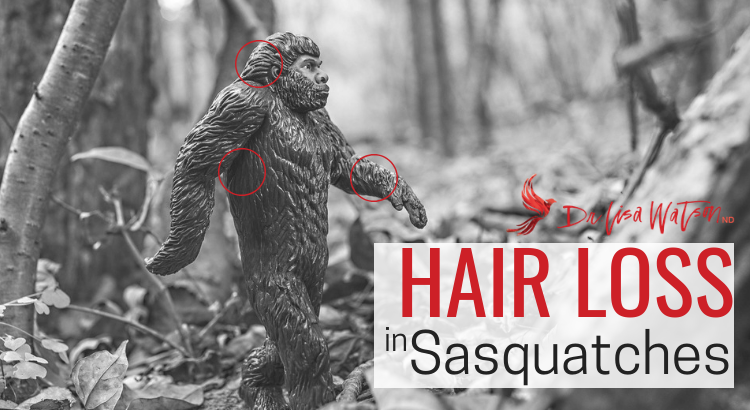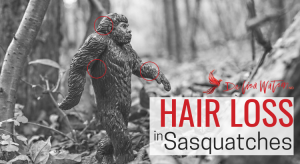
As a doctor in Canada I try to be very sensitive to the health concerns of my fellow Canadians. Issues like high rates of autoimmune disease and multiple sclerosis, vitamin D deficiencies in the vast majority of individuals, and soaring rates of diabetes and heart disease are those I address in my practice every day. And as a Canadian I also care about our supernatural community, most notably the Sasquatch.
Sasquatches (sometimes known as “Bigfoot” based on the most commonly found evidence of their existence), are native to the Pacific coast of North America, mostly through the Rocky Mountains of British Columbia, Oregon and Washington state. Population counts vary as the Sasquatch are notoriously a secretive race.
Hair Loss in Sasquatches
One condition that is known to be distressing to Sasquatches is hair loss. As Sasquatches do not use clothing they rely on their full body hair for warmth during the long northern winters.
Hair loss can have many different causes in both humans and Sasquatches. I have highlighted a few of the most common below:
- Aging – hair loss is a normal process of aging. By 40 years of age, human hair growth slows, and it may be the same for the Sasquatch. New hairs are not replaced as quickly as old ones are lost. This will impact both male and female Sasquatches, however males may have more prominent hair loss due to the impacts of testosterone.
 Hormones – hormones, like testosterone and other androgens (“male hormones”) can contribute to hair loss in men, women and Sasquatches. The hair loss patterns in androgen associated hair loss are often easy to identify. If you see a male Sasquatch with a receding hairline, or with loss from the top of their head, they should consider having their hormone levels tested. If you see a female Sasquatch with all over hair thinning or with more hair on her chin or upper lip, suggest she have her hormone levels looked at.
Hormones – hormones, like testosterone and other androgens (“male hormones”) can contribute to hair loss in men, women and Sasquatches. The hair loss patterns in androgen associated hair loss are often easy to identify. If you see a male Sasquatch with a receding hairline, or with loss from the top of their head, they should consider having their hormone levels tested. If you see a female Sasquatch with all over hair thinning or with more hair on her chin or upper lip, suggest she have her hormone levels looked at.- Low thyroid function – with up to 1 in 5 human adults experiencing low thyroid function it may be possible that rates are equally high in Sasquatches. Low thyroid function can lead to diffuse, all over hair loss, or in some cases patches of total hair loss (alopecia areata.)
- Celiac disease – another condition often associated with alopecia areata, celiac disease occurs when consumption of gluten (wheat, barley, rye) damages the small intestines and causes systemic symptoms by creating antibodies that attack various cells in the body, including hair follicles. The only treatment for the Sasquatch with celiac disease is total avoidance of gluten containing grains – which is not typically a staple in the Sasquatch diet.
- Nutritional deficiencies – depending on the diet of the Sasquatch, they may be prone to nutrient deficiencies that are contributing to hair loss. Just about any nutrient deficiency can lead to hair loss but some of the most common include iron, vitamin A, zinc and essential fatty acids.
Help for Hair Loss in Sasquatches
Just as with my human patients, I encourage any supernatural being, Sasquatch or other, to seek comprehensive testing when they experience hair loss. Many doctors do not adequately assess for the many different conditions that can lead to hair loss, leaving people (and Sasquatches) frustrated and feeling like there are no answers. But most cases of hair loss have an identifiable root cause, and once that is addressed even the most hopeless Sasquatch can regain hope, and potentially a full body of healthy hair.
Disclaimer
The advice provided in this article is for informational purposes by the supernatural community. It is meant to augment and not replace consultation with a licensed monster doctor. Consultation with a Naturopathic Doctor, Dr. Frankenstein, or other primary care provider is recommended for any supernatural being suffering from a health problem.
















